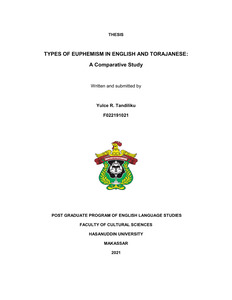Tandiliku, Yulce Rompon (2021) TYPES OF EUPHEMISM IN ENGLISH AND TORAJANESE: A COMPARATIVE STUDY. Thesis thesis, Universitas Unhas.
![[thumbnail of Cover]](/8634/1.hassmallThumbnailVersion/F022191021_tesis%20Cover1.png)

F022191021_tesis Cover1.png
Download (137kB) | Preview
F022191021_tesis DP.pdf
Download (334kB)
F022191021_tesis I & II.pdf
Download (838kB)
F022191021_tesis.pdf
Restricted to Registered users only
Download (1MB)
Abstract (Abstrak)
YULCE R. TANDILIKU. The Types of Euphemisms in English and Torajenese (supervised by Abdul Hakim Yassi and Hamzah A. Machmoed). The research aims to investigate: (1) the types of euphemisms used in in the rituals of "rambu tuka”’, "rambu solo”' and euphemism used in English songs,
(2) the euphemism meanings in the rituals of Tambu tuka’” and rambu solo'" and euphemism used in English songs, (3) the euphemism motives practised by Tana Toraja community.
The research was conducted at Casing Village, Mengkendek District, Tana Toraja Regency. The research used the qualitative descriptive method. Data were collected through the filed research and library research. The data comprised the recording of "rambu tuka’" and “rambu solo”' texts and other supporting resources. The English data were taken from the internet. The research result indicates that there are several types of euphemisms existing in English songs and ritual speeches of “rambu tuka’” and "rambu solo’” at Tana Toraja namely: English songs (tour songs regarding marriage and four songs concerning death) comprising the flippancy, circumlocution, figural, hyperbole, understatement, other types from COCA, they are: omission, remodelling, clipping, acronym, abbreviation, one for substitution, general for specific, part for whole, jargon, loan words, colloquial. While, the ritual texts of “rambu tuka’" and "rambu solo’" at Tana Toraja contain eight types of euphemisms namely; the circumlocution, figurative expression, hyperbole, loan words, jargon, repetition, symbolic, and affirmation, with the circumlocution as the dominant type. In the ritual texts, there are also three types of euphemisms which are not found in Allan and Burridge’s theory, namely; repetition, symbolic, and affirmation.
Key words: Language, euphemism, type, meaning, Torajanese
| Item Type: | Thesis (Thesis) |
|---|---|
| Subjects: | P Language and Literature > PN Literature (General) |
| Depositing User: | Unnamed user with username erwiyanti |
| Date Deposited: | 03 Nov 2021 02:01 |
| Last Modified: | 03 Nov 2021 02:01 |
| URI: | http://repository.unhas.ac.id:443/id/eprint/8634 |


